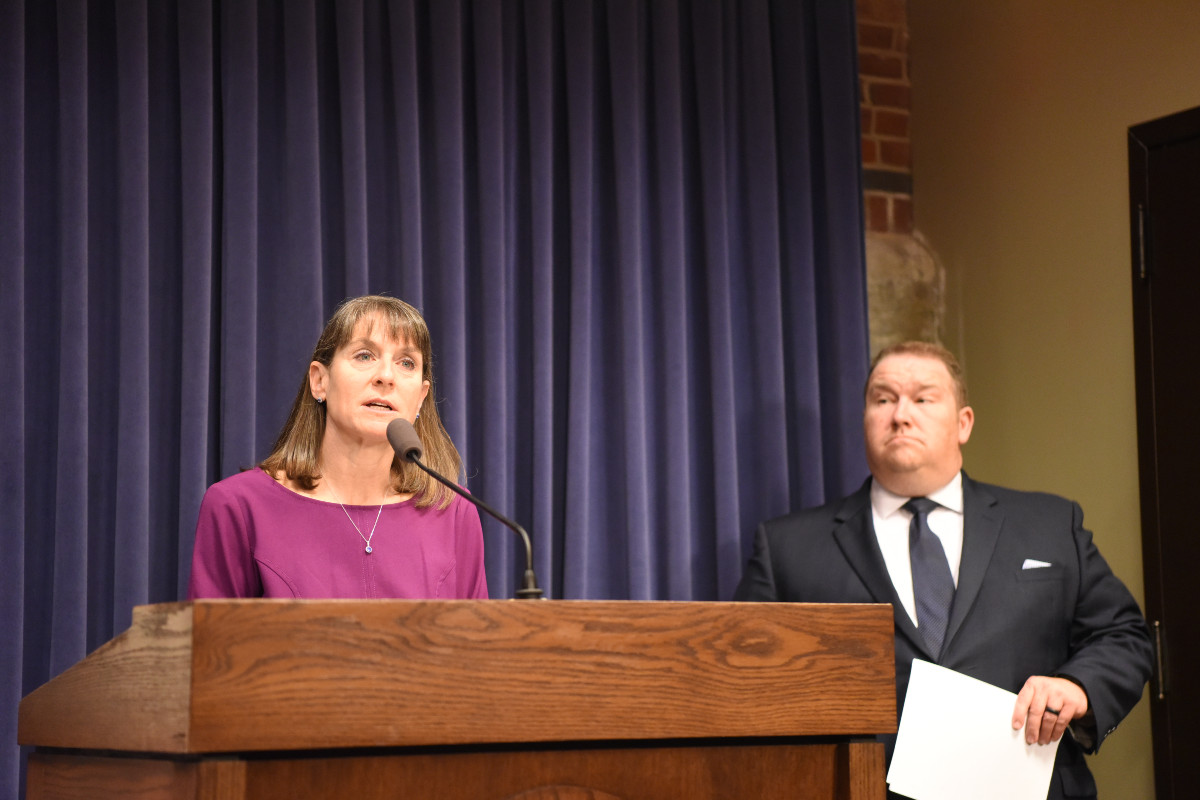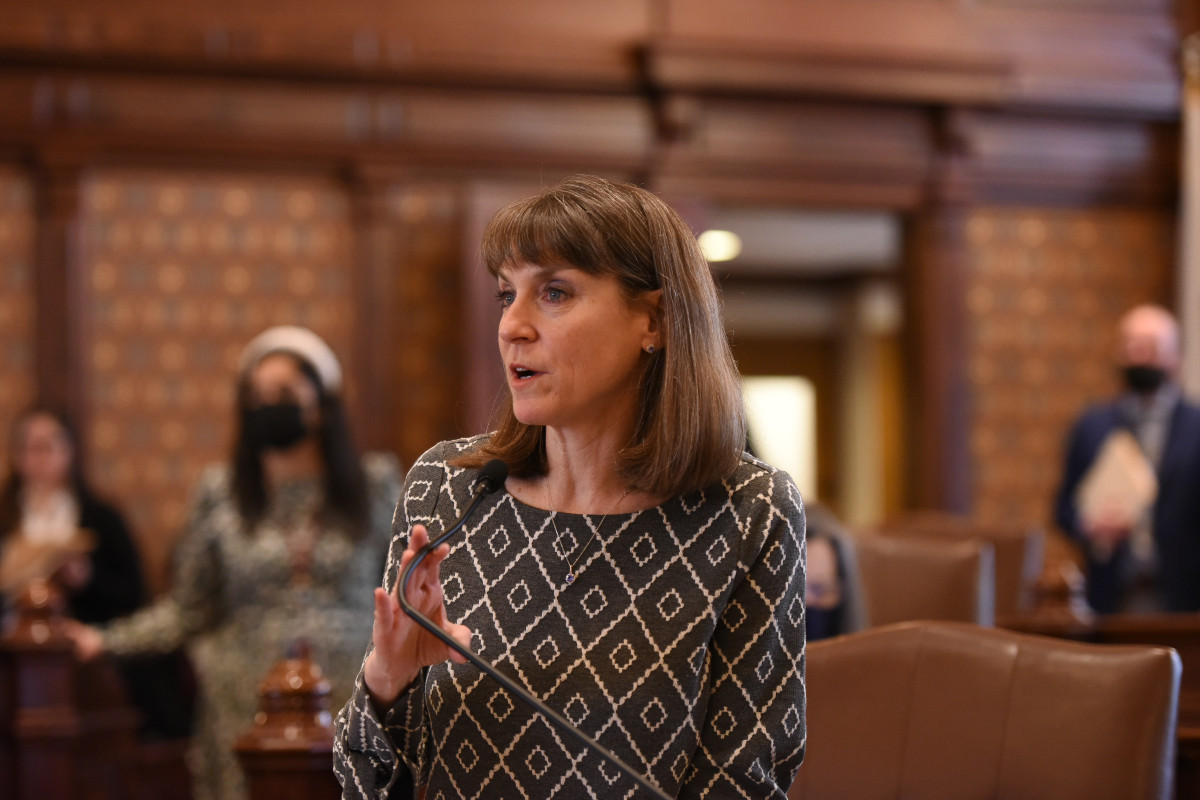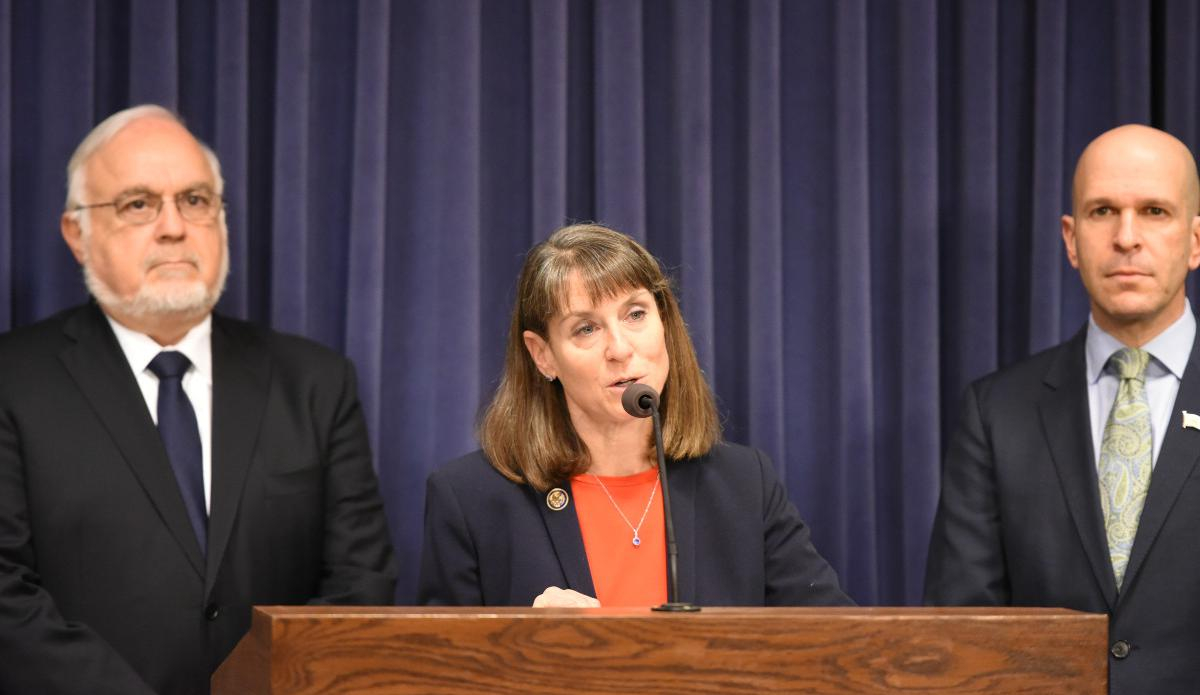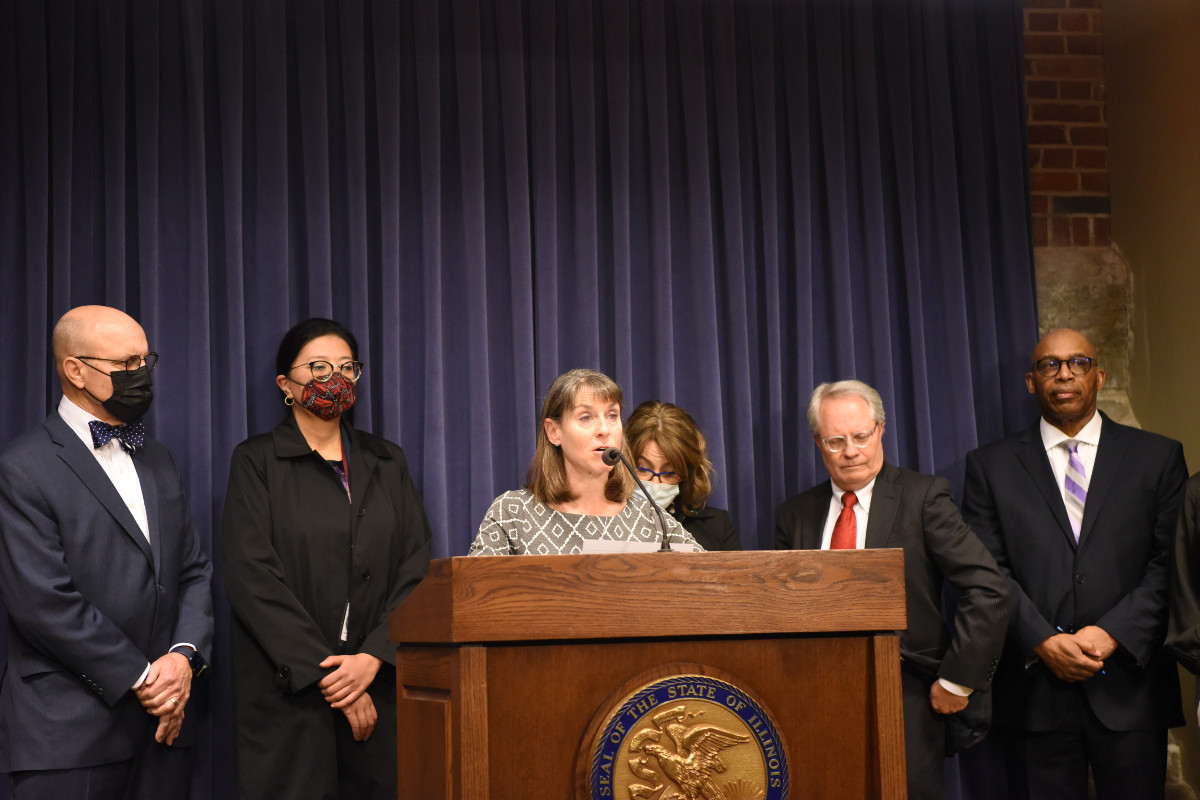- Details
- Category: Press Releases
 SPRINGFIELD – The burdensome costs of textbooks and course materials for college students often deters them from making the purchase, which in turn can cause a learning barrier and hinder a student’s grades. Members of the Illinois Senate Democratic Caucus outlined a plan during a press conference Wednesday to break down those barriers.
SPRINGFIELD – The burdensome costs of textbooks and course materials for college students often deters them from making the purchase, which in turn can cause a learning barrier and hinder a student’s grades. Members of the Illinois Senate Democratic Caucus outlined a plan during a press conference Wednesday to break down those barriers.
Senator Laura Fine (D-Glenview) is leading a measure – Senate Bill 819 – to allow students who receive MAP Grants to use the funds for room and board, as well as coursework materials including books, software and website access. Currently, MAP Grants can only be used for tuition and necessary fee costs.
“While there are initiatives that ease the financial burden of higher education, there are many essentials to university success, such as textbooks, electronics, and nearby housing, that are often overlooked,” Senator Fine said. “We need to make these resources more accessible to students from all economic backgrounds so that they can be successful as they pursue their education.”
Data from the U.S. Bureau of Labor Statistics shows that even as tuition has risen, no cost of college life has increased faster than textbooks. The bureau found that book prices rose 88% between 2006 and 2016, and the College Board — which administers the SAT exam — reported that students budget more than $1,200 each year for textbooks and other class supplies, including technology.
Under Senator Scott Bennett’s (D-Champaign) Senate Bill 3856, public universities and community colleges would be required to provide all necessary coursework materials for rental free of charge for Illinois students.
Many public universities and community colleges, such as Southern Illinois University, already include free textbook rentals in their tuition and fee costs for all students. Recent studies have found that these more affordable course materials can deliver student cost savings of 29% to 35% annually.
“As chair of the Senate Higher Education Committee, I know students face additional costs that can put financial strain on their families making it difficult for them to finish college,” Bennett said. “This textbook incentive will not only reduce that financial burden, but will ensure students are set up for success by having access to all of their course materials.”
While there are currently many initiatives to make higher education more affordable for children from low-income families, few provide relief for middle-class families who also come under large financial strain when sending their children to college.
To address this issue, Senator Laura Murphy’s measure – Senate Bill 1145 – would allow a taxpayer who either is a student or claims one or more students as dependents to earn a tax credit of up to $1,000 toward tuition and fees for Illinois public institutions of higher education.
“Paying for higher education can be a massive financial undertaking for working families,” Murphy said. “It is important that we provide relief to middle-class families working hard to send their children to Illinois schools.”
Mardell Davis, a Springfield High School senior, is in the process of deciding which college to commit to. The costs associated with each school could be a deciding factor for him.
“As a future college student, I am aware of the sometimes high costs attributed to earning a degree,” Mardell said. “I appreciate that the Senate is working on a bill that will make sure all necessary class materials are more affordable.”
For more information on the bills outlined at the press conference, people can visit https://www.illinoissenatedemocrats.com/HigherEd.
- Details
- Category: Press Releases
 SPRINGFIELD—Women who medically require a breast reduction surgery could soon get this procedure covered by their insurance, thanks to a new measure led by State Senator Laura Fine (D-Glenview).
SPRINGFIELD—Women who medically require a breast reduction surgery could soon get this procedure covered by their insurance, thanks to a new measure led by State Senator Laura Fine (D-Glenview).
“For far too long, essential medical procedures for women’s health have been overlooked by insurers,” Senator Fine said. “This measure will make sure that women’s health is prioritized and covered by all private insurance under state law.”
Breast reductions are often dismissed as purely cosmetic procedures, making them ineligible to be covered by insurance. However, there are many reasons that someone may medically require a reduction. Breasts can be the cause of immense neck pain, back pain, posture issues, headaches, numbness, and rashes. In these cases, reduction surgery is necessary to correct these issues and improve the patient’s quality of life.
Fine is working to ensure women who suffer from these complications will be able to undergo breast reduction surgery without significant financial strain. Under Fine's bill, anyone who is considered to medically require a breast reduction surgery and has private insurance in the state would have the procedure covered by their insurance.
“Breast reduction surgery is vital for improving the health and well-being of many in our community and should not be seen as exclusively a cosmetic surgery,” Fine said. “I am proud to make this necessary medical procedure more accessible to women across the state.”
House Bill 4271 passed the Senate on Tuesday. It now goes to the governor’s desk.
- Details
- Category: Press Releases
 SPRINGFIELD –State Senators Laura Fine and Ram Villivalam were joined by their colleagues and representatives from the Simon Wiesenthal Center at a press conference to denounce the rise of hate speech on social media in the past year, and to call on social media companies to actively address and take down posts inciting hate and violence.
SPRINGFIELD –State Senators Laura Fine and Ram Villivalam were joined by their colleagues and representatives from the Simon Wiesenthal Center at a press conference to denounce the rise of hate speech on social media in the past year, and to call on social media companies to actively address and take down posts inciting hate and violence.
“This hateful rhetoric can lead to irrational hatred and discrimination toward groups of people and incite violence against those targeted,” Senator Fine said. “I implore mainstream social media platforms to consider the safety of marginalized people in our communities when they allow hate speech to go unchecked.”
The Simon Wiesenthal Center is a human rights organization committed to fighting anti-Semitism and hate around the world. Each year, the group publishes a digital terrorism and hate report to evaluate social media platforms’ policies on online hate speech. While some platforms introduced efforts to curb misinformation and hate speech, the report found that posts including hate speech were on the rise on Facebook, Instagram, Twitter, YouTube and Google, giving the Center and the Senators cause for concern.
“We cannot ignore the rise of online hate that is making our communities more divisive,” Senator Villivalam said. “Keeping our friends and neighbors safe from hate-motivated harm and speech is a top priority, and I stand with my colleagues to call for an end of this unprecedented level of discrimination.”
The report comes after anti-Semitic flyers were anonymously distributed to homes in Glenview, Park Ridge, and Niles. The flyers included images of prominent Jewish politicians—including Senator Fine—and businesspeople from Illinois and across the country. Members of the Illinois General Assembly are working to address the rise in antisemitism across all platforms to stop the spread of hate and stand up for people who are being targeted.
“There’s no denying that the tsunami of hate continues in our country and that anti-Semites, racists and other violent extremists are leveraging social media platforms to target their victims and recruit young people to their causes. That is why the 2022 release of our Digital Terrorism & Hate Report Card is so important,” said Rabbi Abraham Cooper, associate dean and director of global Social Action at the Simon Wiesenthal Center. “The operative word in the battle against hate in all its forms in our society is accountability. Accountability in our classroom, corporate boardrooms, in our media and in our political discourse. We are grateful for the leadership shown by the elected officials of Illinois, some of whom, themselves have been targets of anti-Semitic campaigns.”
To read the Center’s full report on digital hate speech, visit digitalhate.net.
- Details
- Category: Press Releases
 SPRINGFIELD – In response to a deepening mental health crisis across the state, Senate Democrats hosted a press conference in Springfield on Thursday highlighting legislative efforts that would prioritize mental health support for individuals in Illinois.
SPRINGFIELD – In response to a deepening mental health crisis across the state, Senate Democrats hosted a press conference in Springfield on Thursday highlighting legislative efforts that would prioritize mental health support for individuals in Illinois.
“Staying mentally well should be given the same priority as keeping physically fit,” State Senator Loughran Cappel (D-Shorewood) said. “To achieve this, we need to enact policies to maintain good mental health on top of treating mental illness.”
Loughran Cappel spearheaded legislation – Senate Bill 3889 – in the Senate to add a council within the Children’s Mental Health Partnership in Illinois.
Under this legislation, the council would look for ways to expand the beds in the state, make it easier for out of state residential facilities to be approved with the Illinois State Board of Education, and offer recommendations on how the state can provide better support for children with mental health issues in an annual report to the governor and General Assembly.
“With low residential placements for children with mental disabilities, children are left staying in the emergency room or at home where they are not safe,” Loughran Cappel said. “This council would address the difficulties that so many individuals and their families are facing around the state.”
State Senator Laura Fine (D-Glenview) is also leading a measure aimed at growing the mental health professional workforce in Illinois.
As the current workforce continues to struggle to keep up with increasing demand, Fine’s proposal – Senate Bill 3617 – will accelerate the process for out of state clinicians applying for licensure in Illinois, as well as suspend requirements for social workers, professional counselors, and clinical psychologists with licenses that have been inactive for five years.
Additionally, the legislation includes initiatives to support diversity in the mental health field, establishing tax credits, and many more provisions, all of which will encourage more quality, accessible care to those seeking assistance.
“Due to the current shortage in the mental health workforce, it is difficult for Illinoisans to find the mental health care they need,” Fine said. “This legislation takes the first steps to improve access to mental health care across the state by working to increase the mental health workforce, and reminds people that we support them in their brave decision to seek behavioral and mental health care.”
Senators Loughran Cappel, Fine, Koehler and Villa will continue to work on these initiatives during the spring legislative session.
For more information on the legislation, people can click here.
More Articles …
Page 38 of 75







